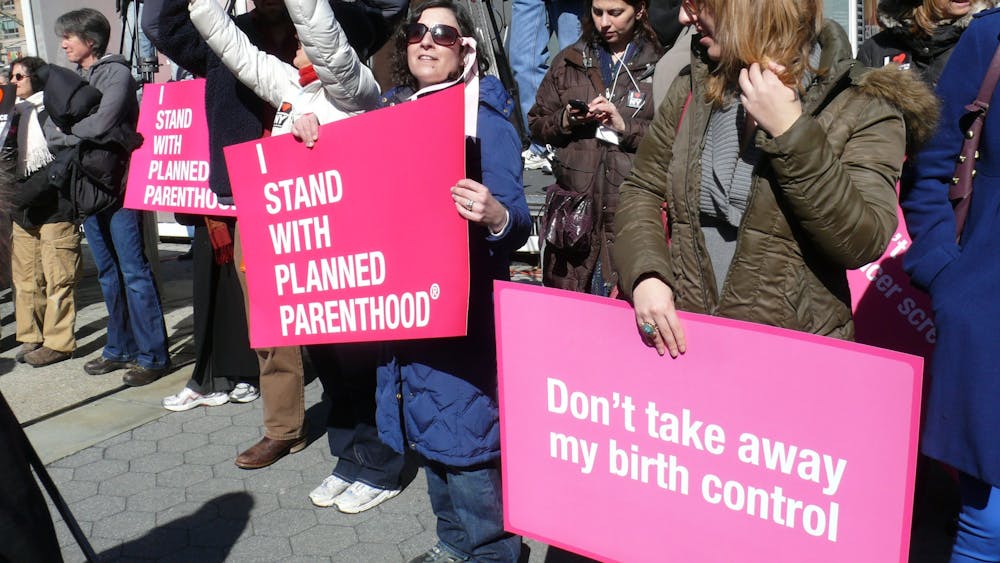As the COVID-19 pandemic has swept the nation, it has also created further barriers in accessing safe medical abortion in many U.S. states. Abortion is one of the most contentious subjects in current American discourse, and in recent decades, debate over this issue has become incredibly unproductive. Advocates on both sides have become increasingly unlikely to interact with and refute opposing arguments.
While I recognize that abortion is a highly emotional issue for legitimate reasons, this fact should not keep us from making honest and clear arguments. As an adamantly pro-choice individual, I believe abortion rights are best protected by meaningfully interacting with pro-life ideology, rather than speaking past it. There are two ways to accomplish this — historically contextualizing modern pro-life ideology and focusing pro-choice arguments on fetal personhood rather than bodily autonomy.
There is no way to end abortion. Pick any historical period, any culture in the world, and women have sought to end their pregnancies. In fact, according to John D’Emilo and Estelle Freedman in their book “Intimate Matters,” the abortion rate in America in the mid 19th century was one abortion for every 5 to 6 live births, a statistic similar to the 2017 abortion rate reported by the Guttmacher Institute. The broad ethical claim that positions all fetuses as morally significant is essentially new to the post-Roe v. Wade world — as the view that life beings at conception, and thus abortion is never permissible, has little hisotrical precedent before the mid-20th century. Thus, it is useful to view the modern pro-life movement as a progressive, rather than conservative one — it literally seeks to create a new categorization of human.
Further, this absolutist pro-life rhetoric can be tied to the dramatic rise of poltically active evangelical Christianity in the 1970s, which worked to politicize “family values” and brought abortion into the protestant consciousness. For example, the Southern Baptist convention supported limited abortion rights through late 1970s. The shift towards dogmatic anti-abortion ideology importanly occured in tandem to increasing backlash against the women’s movement. Thus, current pro-life ideology — particularly that tied to religion — is irreparably tied to shame. It implies that pregnancy is punishment for breaking specific sexual mores, thus justifying the common pro-life exception for rape and incest. Abortion becomes permissible when the woman is not at “fault.”
This core idea that pregnancy is a punishment further explains “pro-birth” sentiment, which advocates for a blanket ban on abortion and a restriction of child welfare programs. While I vehemently disagree with anti-choice reasoning, I can at the very least respectfully disagree with pro-life individuals who support access to birth control, comprehensive sex education and expansion of welfare programs — all things that dramatically decrease abortions by both limiting the number of unplanned pregnancies in the first place and making it financially feasible to raise an unplanned child. However, many pro-life advocates consistently opt-out of this reasoning, showing that their aim is not to limit unplanned pregnancies, but to limit sexuality not confined to marriage and procreation. This further highlights the focus on shaming women rather than reducing the actual quantity of abortions.
With these facts in mind, pro-choice individuals should seek to attack anti-abortion rhetoric on its own terms. After disrupting the implicit assumption that a dogmatically pro-life view is the historical norm and establishing that anti-sexuality policies actually increase abortion by increasing unplanned pregnancy, pro-choice advocates should make claims about fetal personhood. Pro-choice individuals often avoid making fetal personhood arguments due to the uncomfortable truth that while a zygote is undoubtedly radically different from a nine-month-old fetus, there is no clear distinction when one becomes the other. In turn, pro-life advocates use this problem to claim that every stage in pregnancy is essentially the same — that if we can never decisively know exactly when a fetus becomes morally relevant, it is safer to assume a fetus is always morally relevant.
However, instead of addressing this argument, popular pro-choice argumentation tends to simply ignore it in favor of arguing for bodily autonomy. Bodily autonomy arguments are valid — pregnancy is an undeniably physical experience and the pregnant person cannot be separated from their fetus. Without the ability to control the number of children they have, women have no real ability to chart the course of their lives — not only due to the immense financial and emotional burden of childcare, but also the fundamental cruelty of denied bodily autonomy. However, when competing with actual claims about fetal personhood, a body autonomy argument is not convincing. If someone thinks abortion is murder, a woman’s right to her own body holds little weight.
Therefore, pro-choice individuals are best served by focusing their arguments on fetal personhood, and arguing decisively that abortion is morally permissible because the suffering generated by forcing someone to endure an unwanted pregnancy is far worse that the suffering generated though an abortion. In addressing the unclear beginning or personhood, pro-choice individuals should argue that this scientific haziness does not logically grant that personhood begins at conception. If pro-choice argumentation is to be as convincing as possible — paving the way for larger public support of reproductive healthcare that does not combine sexuality with shame, pro-choice advocates must seize on the most convincing arguments they have — we must meaningfully interact with anti-choice rhetoric and work to debunk faulty logic for good.
Emma Camp is a Opinion Columnist for The Cavalier Daily. She can be reached at opinion@cavalierdaily.com.
The opinions expressed in this column are not necessarily those of The Cavalier Daily. Columns represent the views of the authors alone.







